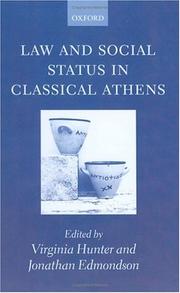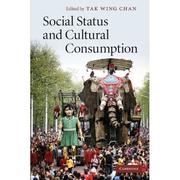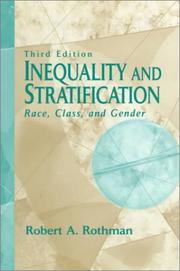| Listing 1 - 10 of 105 | << page >> |
Sort by
|
Book
ISBN: 1400846536 0691138133 0691195978 9781400846535 1299606873 9781299606876 9780691138138 Year: 2013 Publisher: Princeton, NJ
Abstract | Keywords | Export | Availability | Bookmark
 Loading...
Loading...Choose an application
- Reference Manager
- EndNote
- RefWorks (Direct export to RefWorks)
Ancient Greek literature, Athenian civic ideology, and modern classical scholarship have all worked together to reinforce the idea that there were three neatly defined status groups in classical Athens--citizens, slaves, and resident foreigners. But this book--the first comprehensive account of status in ancient democratic Athens--clearly lays out the evidence for a much broader and more complex spectrum of statuses, one that has important implications for understanding Greek social and cultural history. By revealing a social and legal reality otherwise masked by Athenian ideology, Deborah Kamen illuminates the complexity of Athenian social structure, uncovers tensions between democratic ideology and practice, and contributes to larger questions about the relationship between citizenship and democracy. Each chapter is devoted to one of ten distinct status groups in classical Athens (451/0-323 BCE): chattel slaves, privileged chattel slaves, conditionally freed slaves, resident foreigners (metics), privileged metics, bastards, disenfranchised citizens, naturalized citizens, female citizens, and male citizens. Examining a wide range of literary, epigraphic, and legal evidence, as well as factors not generally considered together, such as property ownership, corporal inviolability, and religious rights, the book demonstrates the important legal and social distinctions that were drawn between various groups of individuals in Athens. At the same time, it reveals that the boundaries between these groups were less fixed and more permeable than Athenians themselves acknowledged. The book concludes by trying to explain why ancient Greek literature maintains the fiction of three status groups despite a far more complex reality.
Social status --- Social standing --- Socio-economic status --- Socioeconomic status --- Standing, Social --- Status, Social --- History. --- Athens (Greece) --- Greece --- Social conditions. --- Social conditions --- Power (Social sciences) --- Prestige
Book
ISBN: 9783031054013 Year: 2022 Publisher: Cham Springer International Publishing :Imprint: Palgrave Macmillan
Abstract | Keywords | Export | Availability | Bookmark
 Loading...
Loading...Choose an application
- Reference Manager
- EndNote
- RefWorks (Direct export to RefWorks)
Social stratification. --- Social status. --- Social standing --- Socio-economic status --- Socioeconomic status --- Standing, Social --- Status, Social --- Power (Social sciences) --- Prestige --- Stratification, Social --- Equality --- Social structure --- Social classes

ISBN: 0199240116 9780199240111 Year: 2004 Publisher: Oxford ; New York : Oxford University Press,
Abstract | Keywords | Export | Availability | Bookmark
 Loading...
Loading...Choose an application
- Reference Manager
- EndNote
- RefWorks (Direct export to RefWorks)
Social status --- Status (Law) --- History. --- -Status (Law) --- -Civil status --- Social standing --- Socio-economic status --- Standing, Social --- Status, Social --- Prestige --- Civil status --- Socioeconomic status --- History --- Persons (Law) --- Power (Social sciences) --- Status (Law) - Greece - Athens - History. --- Social status - Greece - Athens - History.

ISBN: 1283024012 9786613024015 082238647X 0822335751 0822335875 Year: 2005 Publisher: Durham : Duke University Press,
Abstract | Keywords | Export | Availability | Bookmark
 Loading...
Loading...Choose an application
- Reference Manager
- EndNote
- RefWorks (Direct export to RefWorks)
Essays examine the relationship of honor in Latin America to issues such as state formation, modernity, the law, sexuality, and racial mores.
Law --- Social status --- Honor --- Social aspects --- Honour --- Social standing --- Socio-economic status --- Socioeconomic status --- Standing, Social --- Status, Social --- Acts, Legislative --- Enactments, Legislative --- Laws (Statutes) --- Legislative acts --- Legislative enactments --- Chivalry --- Conduct of life --- Power (Social sciences) --- Prestige --- Jurisprudence --- Legislation
Book
ISBN: 0511852649 1107217636 1282918729 9786612918728 0511931468 0511932804 0511927614 0511925077 0511779607 0511930127 9780511932809 9780521766913 0521766915 9780511779602 9781107637610 1107637619 9780511852640 9781107217638 9781282918726 6612918721 9780511931468 9780511927614 9780511925078 9780511930126 Year: 2011 Publisher: Cambridge Cambridge University Press
Abstract | Keywords | Export | Availability | Bookmark
 Loading...
Loading...Choose an application
- Reference Manager
- EndNote
- RefWorks (Direct export to RefWorks)
Are children of equal, lesser, or perhaps even greater moral importance than adults? This work of applied moral philosophy develops a comprehensive account of how adults as moral agents ascribe moral status to beings - ourselves and others - and on the basis of that account identifies multiple criteria for having moral status. It argues that proper application of those criteria should lead us to treat children as of greater moral importance than adults. This conclusion presents a basis for critiquing existing social practices, many of which implicitly presuppose that children occupy an inferior status, and for suggesting how government policy, law, and social life might be different if it reflected an assumption that children are actually of superior status.
Children. --- Social status --- Childhood --- Kids (Children) --- Pedology (Child study) --- Youngsters --- Age groups --- Families --- Life cycle, Human --- Social standing --- Socio-economic status --- Socioeconomic status --- Standing, Social --- Status, Social --- Power (Social sciences) --- Prestige --- Moral and ethical aspects. --- Law --- General and Others
Book
ISBN: 1501710745 1501710737 1501710753 Year: 2018 Publisher: Ithaca, NY : Cornell University Press,
Abstract | Keywords | Export | Availability | Bookmark
 Loading...
Loading...Choose an application
- Reference Manager
- EndNote
- RefWorks (Direct export to RefWorks)
Myungji Yang's From Miracle to Mirage is a critical account of the trajectory of state-sponsored middle-class formation in Korea in the second half of the twentieth century. Yang's book offers a compelling story of the reality behind the myth of middle-class formation. Capturing the emergence, reproduction, and fragmentation of the Korean middle class, From Miracle to Mirage traces the historical process through which the seemingly successful state project of building a middle-class society resulted in a mirage.Yang argues that profitable speculation in skyrocketing prices for Seoul real estate led to mobility and material comforts for the new middle class. She also shows that the fragility inherent in such developments was embedded in the very formation of that socioeconomic group.Taking exception to conventional views, Yang emphasizes the role of the state in producing patterns of class structure and social inequality. She demonstrates the speculative and exclusionary ways in which the middle class was formed. Domestic politics and state policies, she argues, have shaped the lived experiences and identities of the Korean middle class.From Miracle to Mirage gives us a new interpretation of the reality behind the myth. Yang's analysis provides evidence of how in cultural and objective terms the country's rapid, compressed program of economic development created a deeply distorted distribution of wealth.
Social status --- Middle class --- Bourgeoisie --- Commons (Social order) --- Middle classes --- Social classes --- Social standing --- Socio-economic status --- Socioeconomic status --- Standing, Social --- Status, Social --- Power (Social sciences) --- Prestige --- Social conditions --- Korea (South) --- Social conditions. --- South Korea, middle class, globalization, economic development.
Book
ISBN: 9780128092941 0128092947 9780128053713 0128053712 Year: 2018 Publisher: London, England : Academic Press,
Abstract | Keywords | Export | Availability | Bookmark
 Loading...
Loading...Choose an application
- Reference Manager
- EndNote
- RefWorks (Direct export to RefWorks)
The Handbook of Social Status Correlates summarizes findings from nearly 4000 studies on traits associated with variations in socioeconomic status. Much of the information is presented in roughly 300 tables, each one providing a visual snapshot of what research has indicated regarding how a specific human trait appears to be correlated with socioeconomic status. The social status measures utilized and the countries in which each study was conducted are also identified.--
Social status. --- Social classes. --- Class distinction --- Classes, Social --- Rank --- Caste --- Estates (Social orders) --- Social status --- Class consciousness --- Classism --- Social stratification --- Social standing --- Socio-economic status --- Socioeconomic status --- Standing, Social --- Status, Social --- Power (Social sciences) --- Prestige

ISBN: 9780521194464 9780511712036 9781107406988 9780511712753 0511712758 0511714831 9780511714832 9780511722899 0511722893 0511712030 0521194466 9780511713583 1107406986 1107204763 9781107204768 1283331365 9781283331364 0511713584 9780511713583 9786613331366 6613331368 0511716087 9780511716089 Year: 2010 Publisher: Cambridge Cambridge University Press
Abstract | Keywords | Export | Availability | Bookmark
 Loading...
Loading...Choose an application
- Reference Manager
- EndNote
- RefWorks (Direct export to RefWorks)
Leading scholars from around the world examine the social stratification of arts and culture in contemporary society.
Social stratification --- Sociology of culture --- Consumption (Economics) --- Social status --- Social aspects --- Social status. --- Social aspects. --- Social standing --- Socio-economic status --- Socioeconomic status --- Standing, Social --- Status, Social --- Power (Social sciences) --- Prestige --- Consumer demand --- Consumer spending --- Consumerism --- Spending, Consumer --- Demand (Economic theory) --- Social Sciences --- Sociology --- Consumption (Economics) - Social aspects

ISBN: 9027706778 9789027706775 Year: 1976 Volume: 12 Publisher: Dordrecht Reidel
Abstract | Keywords | Export | Availability | Bookmark
 Loading...
Loading...Choose an application
- Reference Manager
- EndNote
- RefWorks (Direct export to RefWorks)
Social ethics --- Methods in social research (general) --- Sociology of culture --- Ethics --- Social status --- Social standing --- Socio-economic status --- Socioeconomic status --- Standing, Social --- Status, Social --- Power (Social sciences) --- Prestige --- Social problems --- Sociology --- Deontology --- Ethics, Primitive --- Ethology --- Moral philosophy --- Morality --- Morals --- Philosophy, Moral --- Science, Moral --- Philosophy --- Values --- Ethics. --- Social ethics. --- Social status.

ISBN: 0132695316 Year: 1999 Publisher: Upper Saddle River Prentice Hall
Abstract | Keywords | Export | Availability | Bookmark
 Loading...
Loading...Choose an application
- Reference Manager
- EndNote
- RefWorks (Direct export to RefWorks)
Social stratification --- 316.34 --- Sociale differentiatie. Sociale typologie. Sociale stratificatie --- Equality --- Minorities --- Social classes --- Social status --- Social structure --- 316.34 Sociale differentiatie. Sociale typologie. Sociale stratificatie --- Social standing --- Socio-economic status --- Socioeconomic status --- Standing, Social --- Status, Social --- Power (Social sciences) --- Prestige --- United States --- Social conditions.
| Listing 1 - 10 of 105 | << page >> |
Sort by
|

 Search
Search Feedback
Feedback About UniCat
About UniCat  Help
Help News
News